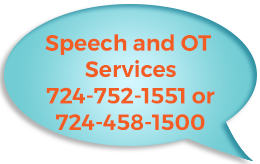Speech Therapy for Children
Speech Therapy for Children:
Speech-Language Pathologists treat children with a wide range of abilities from mild delays to severe or profound delays. Children might need speech-language therapy as a result of a primary physical condition such as:
- hearing loss or inconsistent hearing from repeated ear infections
- cognitive or other developmental delays
- weak oral muscles
- excessive drooling
- chronic hoarseness
- birth defects such as cleft lip or cleft palate
- autism
- motor planning problems
- respiratory problems (breathing disorders)
- feeding and swallowing disorders
- traumatic brain injury
In children, SLPs assess and help improve disorders in the following areas:
- Receptive Language / Auditory Processing – Difficulties understanding or processing the words we hear
- Expressive Language – Difficulty putting words together, limited vocabulary, or inability to use language in a socially appropriate way
- Articulation and Phonology – Difficulties producing sounds in syllables or saying words incorrectly to the point that a listener can’t understand what’s being said
What Role does Speech and Language Play in Literacy – Learning to Read and Write?
- Motor Speech Skills / Oral Motor Skills – Difficulties with strength, coordination or sequencing/planning of speech productions (i.e. Apraxia, Childhood Apraxia of Speech (CAS) or Dysarthria)
- Communication skills in those with Hearing Loss – Difficulty with listening or speaking due to lack of ability to hear spoken speech
- Fluency – Difficulty with the flow of speech which is interrupted by abnormal stoppages, repetitions (st-st-stuttering), or prolonging sounds and syllables (ssssstuttering).
Do you think your child is stuttering and would like to read more?
- Social/Pragmatic skills – Difficulty interpreting or using social language skills such as eye contact, initiating or maintaining appropriate conversation.
- Swallowing and Chewing – Difficulties with chewing, drooling, eating, and swallowing
- Voice and Resonance – Problems with the pitch, volume, or quality of the voice that distract listeners from what’s being said.



